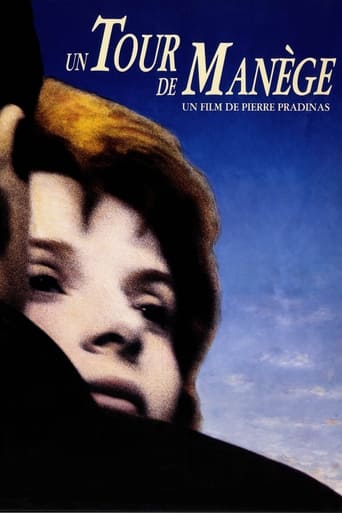



Some things I liked some I did not.
One of the wrost movies I have ever seen
Best movie of this year hands down!
As somebody who had not heard any of this before, it became a curious phenomenon to sit and watch a film and slowly have the realities begin to click into place.
View More"Un Tour de Manège" stars Juliette Binoche and Francois Cluzet as Elsa and Al, a pair of troubled Parisian lovers. The film gently portrays their initially broken relationship as they re-build it and it ultimately falls apart due to miscommunication and lies.The film is slight in all senses, but it does elegantly sketch out the relationship of the protagonists. Cluzet's Al is strong and determined as he sets about constructing a career and looking after his beloved Elsa. Cluzet is a strong presence and his sheer physicality envelops the screen.As the gamine Elsa, Binoche is very reminiscent of her role in Léos Carax's "Mauvais Sang". She is a passive, albeit bewitching presence. Her performance is low, key but the sadness in her eyes makes it utterly compelling.Pradinas's direction is sure and steady. The screenplay by Pradinas and Alain Gautre however is a bit too rambling, lacking both direction and purpose.Beautifully filmed on,location in Paris the film is very visual with strong blues and reds and fluid camera movement.
View More"Un Tour de Manège" is Pierre Pradinas's only film. He is however an accomplished theatre director. This shows in his film, which is at times overly theatrical in structure.The film opens as François Cluzet's Al comes to terms with losing his girlfriend Elsa, who has walked out on him. In her absence he has returned to his old vices of drinking and gambling. He also takes the time to audition for a film.Then Elsa, played by Juliette Binoche, returns and the pair rekindle their romance. At first things are great, but Al's bad habits soon cause problems between the pair. When Al gets the part in the film they move to a better apartment, but their problems follow them, as do a new entourage of people including the nasty Berville (Lavant) and the obsessive Rateau (Silbertain-Blanc). Quickly Al and Elsa's old problems return.Pradinas's slight film seems lacks character development. Juliette Binoche'sElsa is a mere cipher. She is sad and melancholic, but the film never explores why this is. The character seems like an extension of her more rounded Anna in Carax's superior "Mauvais Sang". This link to Carax is furthered by the presence of Denis Lavant in a small role.François Cluzet's Al comes off slightly better, the initial scenes give the character some depth, but this is lost later.The film is most successful visually, with rapturous shots of Paris, as the characters interact mostly on the streets of the wonderful city.Pradinas's film is at it's most interesting when focusing on the intimacies of the main characters - as they enjoy a cigarette on a park bench, or stare lovingly at each other over a meal, but in comparison to the Binoche/Carax films it apes, the film falls far short.
View More